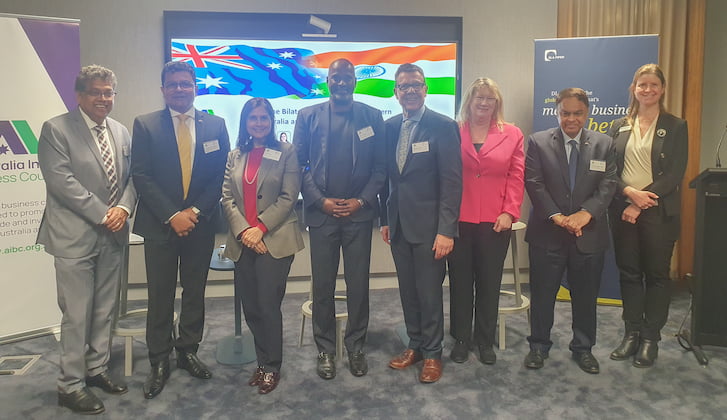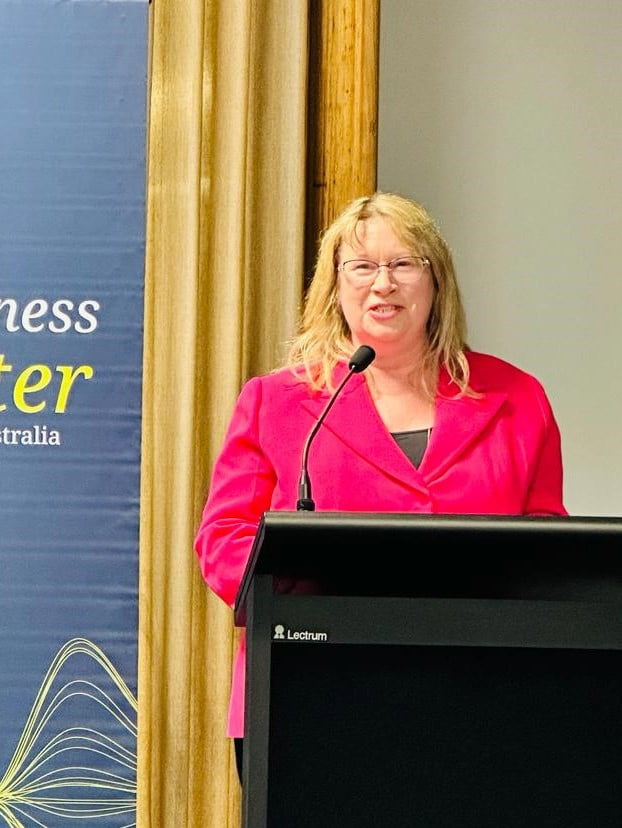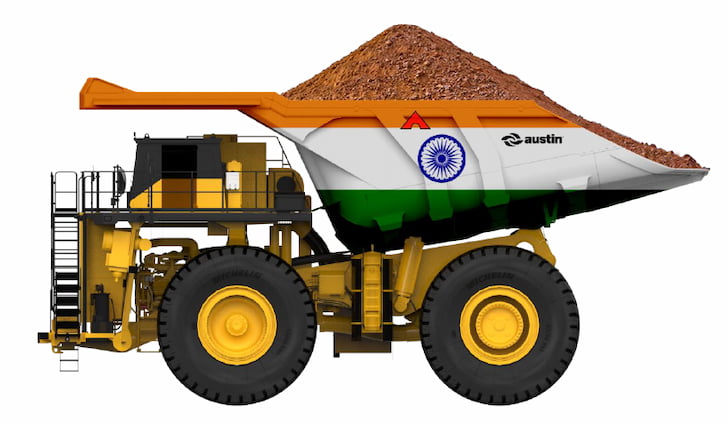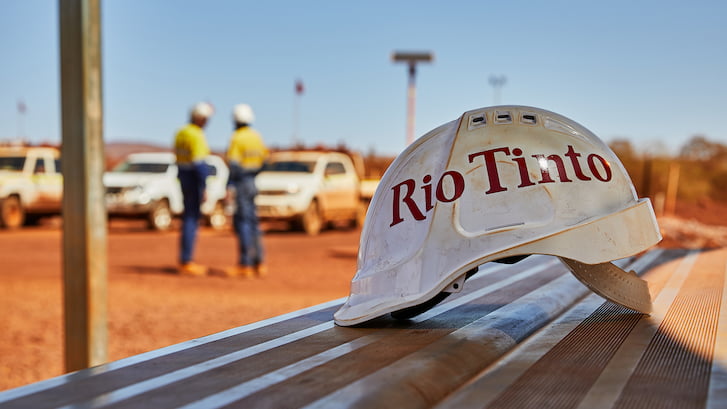Australia is striving to finalise the Australia-India Comprehensive Economic Cooperation Agreement (CECA) by the end of the year.

(L-R) Parliamentary Secretary to the Minister for Finance and Commerce Dr Jagadish Krishnan MLA; Australia India Business Council WA (AIBC)’s Paritosh Misra; Centre of Australia-India Relations’ Swati Dave and Tim Thomas; CCIWA’s and AIBC’s Michael Carter; Department of Foreign Affairs and Trade’s (DFAT) Frances Lisson; Indian Consul General, Perth, Amarjeet Singh Takhi; and DFAT’s Sally Dawkins. Photo courtesy of AIBC.
Frances Lisson, the Department of Foreign Affairs and Trade’s (DFAT) Chief Negotiator of CECA, gave an update on Australia’s bilateral trade relationship with India at an event hosted by the Australia India Business Council on June 27.
“Improving ECTA to make sure that it’s fit for the future is what we really want to do in the CECA negotiations,” Lisson says, who was also the Chief Negotiator for the Aus-India Economic Cooperation and Trade Agreement (ECTA), which entered into force on 29 December 2022.
CECA is focused on building on ECTA by expanding market access and broadening the agreement.
“Improving market access is our clear focus and we’re working very hard on that. And that is for goods, services and mobility issues, which are a strong interest of India,” Lisson says.
“We also want to build cooperation and collaboration. This is touched on in ECTA, but there’s a lot of scope to work together in a wider range of new areas, which really reflects the direction of our bilateral relationship and future economic collaboration.”
Possible areas of cooperation between Australia and India, Lisson says, include critical minerals, agricultural technology, innovation, platforms to support startups, small to medium businesses (SMEs) and sport.
ECTA a ‘landmark agreement’

DFAT Chief Negotiator of ECTA and CECA Frances Lisson. Photo: AIBC.
Lisson says ECTA marks a significant evolution in India’s approach to international trade, not just with Australia but the world as well.
“It was a landmark agreement, because it’s the first free trade agreement (FTA) India has done with a developed country outside of Asia, giving Australia a valuable first-mover advantage. It’s also significant because India has traditionally had very high trade barriers and focused on self-sufficiency But more recently, it has looked outwards and is in the process of negotiating FTAs with many countries,” she says.
ECTA has already eliminated tariffs on 85% of Australia’s exports to India on products such as wool, lamb, barley, oats, fresh rock lobsters, cosmetics and many metallic ores, critical minerals, non-ferrous metals and titanium dioxide. High tariffs on a further 5% of goods are being phased down to zero by 1 January 2028.
According to DFAT, ECTA would save Australian exporters about $2 billion a year in tariffs, while businesses and consumers would save around $500 million in tariffs on imports of finished goods and inputs to Australia’s manufacturing sector.
Australian services gained full or partial market access across 85 sectors, including distribution, finance and telecommunications. Importantly, ECTA included a Most Favoured Nation clause which means any agreement or concessions India gives to future FTA partners for various services sectors, such as education, finance, engineering and tourism, and for wine is automatically granted to Australia too.
ECTA also focused on people-to-people links, including supporting tourism and workforce needs in regional Australia through the Work and Holiday Program for young Indian travellers, post-study work opportunities and setting up a framework to recognise professional qualifications.
Business success with ECTA
Businesses have wasted no time utilising ECTA and since coming into force, ECTA Certificates of Origin (COs) issued by CCIWA have increased significantly.
CCIWA Head of International Trade and Investment Centre, Michael Carter, says over the past six months the number of ECTA COs have been the third largest by volume, compared to nineth for the previous corresponding.
“In essence the take up of ECTA COs has been remarkable in such a short period of time, demonstrating that existing exporters, as well as new exporters, to India are seeing the benefits of ECTA for growing their business in this US$3.1 trillion economy,” he says.
“Whilst we have witnessed an uplift in traditional exports to India like metal ores, grains, pulses and wool, it’s been interesting to see new export categories like chemicals, machinery and equipment, seafood and wine creeping in and supporting the benefit for exporters to use ECTA for their shipments to India.”

Render of the Austin designed truck tray painted in India’s national colours as per supply intent. Image source: Austin Engineering.
Austin Engineering Limited is one CCIWA Member which has taken advantage of the Indian FTA. Last month it received a purchase order for four haul truck trays from a major iron ore producer in India. It is Austin’s first order for truck trays to India.
The company says the order potentially opens a substantial new market opportunity for its Asia Pacific business.
“We are very excited to have this entry point into India as we continue to broaden our customer network across the Asia Pacific region. India is the world’s third largest iron ore producer, and we are pleased to have secured an order with one of the country’s major miners,” says CEO and Managing Director David Singleton.
“It presents an important opportunity for Austin to market its customised equipment and the potential advantages it could bring the country’s iron ore sector. We also see India as a logical market expansion opportunity given our existing experience in the Australian iron ore sector.”
The Austin tray is designed to deliver an additional circa 66,000 tonnes of ore per annum per truck with less downtime for maintenance to replace wear liners.
“The Australian Government has vastly improved business access and trade opportunity with India through an elimination, reduction or phase out of tariffs, and we see a long-term future potential for Austin in this market,” Singleton says.
How can businesses take advantage of ECTA?
CCIWA has been actively building awareness of the ECTA across WA exporters and in a collaborative way with key stakeholders including Australia India Business Council, Department of Foreign Affairs and Trade, Australian Trade Commission, Invest and Trade and the recently established Centre for Australia India Relations.
WA exporters and importers can visit the DFAT Free Trade Agreement Portal to see how ECTA impacts their trade.
“I think that ECTA has now made it possible for businesses of all shapes and sizes across a broader range of industry sectors to establish their international business more effectively in this emerging economic powerhouse,” Carter says.
“Given the enormity and diversity of the Indian consumer marketplace, it’s important to identify where that market entry channel will be established. That’s where CCIWA’s International Trade and Investment Centre can help navigate the market entry priorities and import protocols and procedures.”
CCIWA’s International Trade and Investment Centre (ITIC) helps businesses reduce the time, cost and risk of going global. Contact the team for a free consultation on (08) 9365 7620 or via [email protected].






